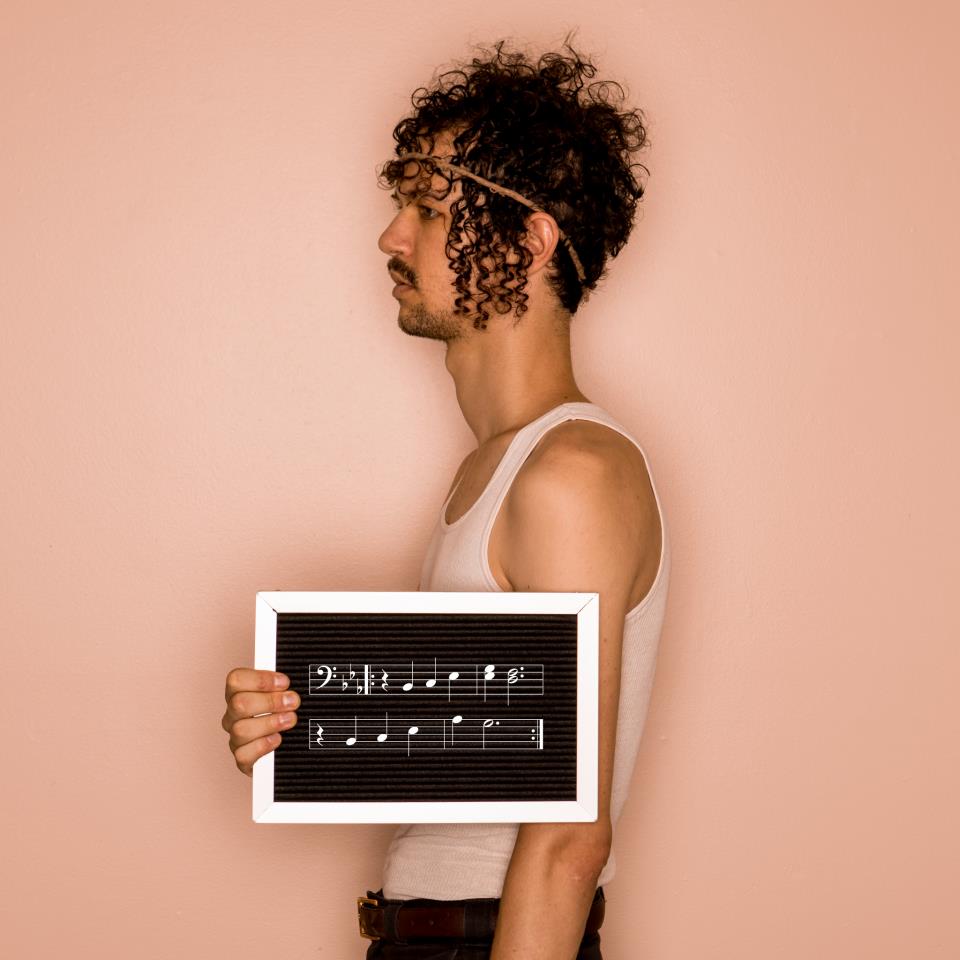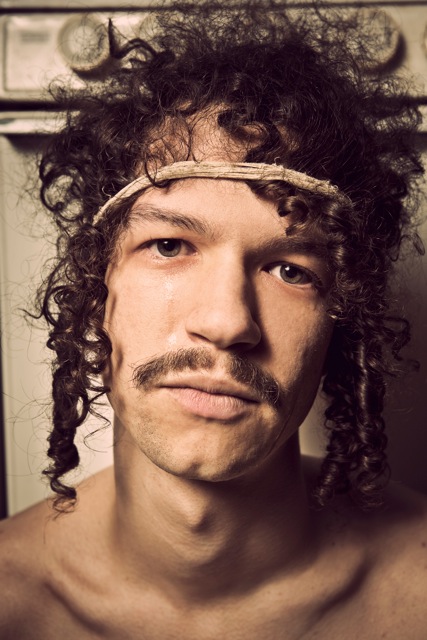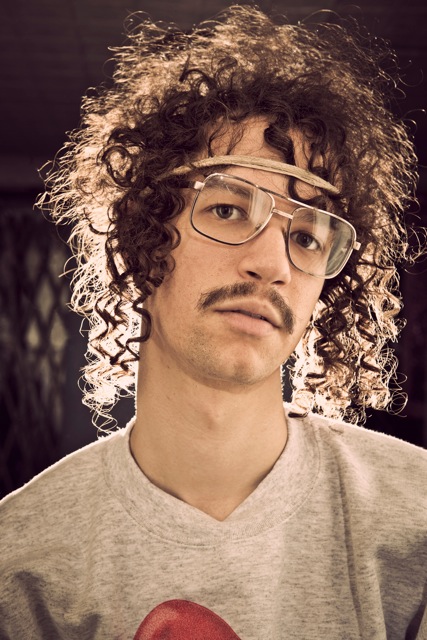

Darwin Deez: a mystery much like he says life is. After we met, I initially came away feeling satisfied with the answers he'd given in relation to my questions about Songs For Imaginative People, and about his music and creativity more generally. Although, with the passing of time, and allowing for a window of reflection, I realized our conversation had actually raised more questions than it had answered -- not in an obtuse way, but more in a philosophical, thought-provoking way.
Sophomore record, Songs For Imaginative People is one that will get Deez's listeners thinking about life beyond the beat; of his music, and beyond what one might accept as the natural rhythm of life. By this I mean looking beyond what is largely an unquestioned path for us in life because in its following social beings, 'humans,' have been told it will lead to success and acceptance.
This record is a nod to existentialism. It hails 'freedom' in a world that is governed by so-called predetermined living -- transmitted through a 'shitty commercial' on TV or some inanimate object amid social space, where people are commanded to prescribe if they want to be considered 'human.' Tracks like '(800) HUMAN,'then, illuminate and question the position and understanding of different aspects of life and living.
Lydia Hughes: I wanted to ask you about the first track on the record, '(800) HUMAN.' What is the meaning behind it?
Darwin Deez: "There was an angriness to it. For me, its just sort of a 'what if?' I'm really into existentialism -- basically the idea that you can do whatever you want with your life. I think its just true. What if that modality of choice was how we ended up being human beings in the first place?
Photo Credit: Family Ltd
Furthermore, what if that choice was influenced by some shitty commercial, and that's how we got here? I just find that TV is a really strong factor in my life. I believe that we are more essentially spirits than we are these bodies, and so the song is a kind of like, what if there was TV also in the spirit world that could influence me and tempt me to waste my time, and could lure me into a body? But the commercial can't tell you who you are, the TV can't tell you who you are -- that's kind of the irony -- but it really wants to, you know.
And at the end, its also just kind of like, life's a mystery. We don't really know how we got here. But there's a familiarity to it -- familiarity of music itself. Its like, why should music be beautiful? It's just notes. It's just various sums of tensions of release, that's it! So why should it feel so deep? The only thing that we may have direct evidence of is our bodies, so why should we be so sure that we're more than that, you know? But there's like a familiarity to it, so the end of the song is about that."
Not only does Deez get you thinking about the world and your place within it, this record, like his eponymous debut, is essentially about love and hope. As part of Songs For Imaginative People, Deez shows the ambiguous, tense relationship between love and hate. As a listener, you're often left in a state of confusion about how he's feeling exactly, and/or you can sympathetically understand this confusion by being able to identify with your own experiences of having been in love or life before.
And this battling tension between one thing versus another is a standard signature throughout the whole of the record -- where familiarity versus mystery and the upbeat nature of pop versus the undertones of melancholy. This state of confusion, though, is something that should be celebrated, because it translates as real life. Life isn't straight-forward, therefore why should Deez's expression through music be?
Lydia Hughes: Would you say this album is more considered in terms it's content than your last record?
Darwin Deez: "I think that's about the same. You know, little bit of philosophy, and a lot of love songs. That's the same, basically. If you look at the last record...same breakdown, topically."
Lydia Hughes: The titles of the tracks on the last record are quite dark, but the music is still very upbeat. This time round, even though its still upbeat, it seems to have an even greater sense of melancholy...
Darwin Deez: "Side two is definitely melancholy... just came out, you know. I really wanted to make, and I continue to make, it my mission to make energizing, upbeat, positive music. So I think even on side two, which is melancholy, there's hope, you know. 'All In The Wrist' is a song about hope. It's a sad song, but ultimately, there's hope. I never let myself give up hope... I mean, not since I was eighteen. 'Free' is actually a memoir about that time in my life.
Lydia Hughes: So what was going on during that time in your life?
Darwin Deez: "I was reading too much Nietzsche, and I couldn't handle it. It wasn't for me."
Lydia Hughes: The last song on the album 'Chelsea's Hotel' strikes the hope chord -- the hope to get back with Chelsea, making her realize that you're better for her than the person she's with now...
Darwin Deez: "Its just a picture of that moment, of determination...romantic determination. It's just a romantic feeling. Songs work well with that. That stuff works better in songs than in life. In life, as soon as this situation that gave birth to that song happened in my life, I started going, "Right, time to get over Chelsea," you know. Emotionally, I was still on the upswing in terms of falling in love. But I knew, "Ah, fuck, this is annoying, because I know I have to get back down here." But in order to get over her I had to finish falling in love with her. Fucking...shitty, shitty situation. The song came out of a really raw place, and I think that it's one of the best songs on the record. It's some of the best lyrics I've ever written. I was taking a walk and I started writing them, I was really emotional -- and that's not usually what happens."
Lydia Hughes: Given the amount of songs and poetry written about the Chelsea Hotel, I wondered whether 'Chelsea's Hotel' was another tribute?
Darwin Deez: "That was mostly just because it was a pun that was obvious, which was thrown at me from the song that came out. And also, she and I first met in New York, like six years ago. And also, I was feeling really on my game, so I wanted to go toe-to-toe with Leonard Cohen. I was like, "Fuck it... bring it... let's go!... who's better?" And I'm really proud of that song, I'm really proud of the lyrics in that song. And its a song about a hotel for Chelsea, so therefore its called 'Chelsea's Hotel.'"
Lydia Hughes: Track two, 'You Can't Be My Girl,' is interesting in terms of the juxtaposition it brings; a love-hate relationship which manifests in the combination of its sound with lyrics. Even the lyrics alone demonstrate this. "I think I love you are horrible" and "You can't be my girl" are both lines that have pauses in them when they are sung. And so their translation can be interpreted in different ways. Are you saying "I think I love you" or "you are horrible"? and telling her "You can't be my girl" or asking "be my girl"?
Darwin Deez: "Ha ha, yeah. I wouldn't expect most people to get that pause. I was just trying to say it musically, you know. "You can be my girl"... the fact that I'm saying "You can't" sort of implies that I'm considering it... or that I would like her to be. If there were no chance in hell then that wouldn't be a feeling. There's nothing to say. The opposite of love isn't hate, its indifference. So this is like love."

Lydia Hughes: How is the scope of the album different to last time?
Darwin Deez: "Just the production style. The production on every song on the first record was...same tambourine, same clap, same guitar tone, same vocal production. This one, the vocal production is the same, mostly, but the other stuff is all varied. It ends up having a wider production."
Lydia Hughes: Last time you intentionally wanted the production to be quite restricted, though, didn't you?
Darwin Deez: "Yeah, because no one knew who I was, so I needed to establish an identity, so I did that. Some would criticise it and say that they all sound too similar and, I'm like, you're right... they all sound similar. But that's what I had intended to do, and that's what I did. I think that way I can really show off myself the best because I think given how similar they sound, how listenable and -- I think -- good the album is, is true testament to the song writing, you know.
And I feel like that is one of my strong suits. And I definitely feel more confident, more proud, of my song-writing than I do about my singing. I'm not a jazz singer, I'm not a trained singer, I'm not an amazing singer, you know. But I feel like, in my best moments, I've done some song-writing that I'm really happy with. So that was the point, to show that off. If you factor the production out then there's only the song-writing. So now you know I'm a good song-writer, now you can have some tasty production bits, too."
Lydia Hughes: So would you say you've reached unchartered territory this time?
Darwin Deez: "I think its mostly been done, but it hasn't been done quite enough. Like, I don't think I'm doing anything essentially different from The Dismemberment Plan, you know. It's got a different flavor. Their shit was more rock and this shit is more pop but that's just one band. It's hard to think of too many other bands that had a voice that was so contemporary and direct. And when I heard that music -- which was like 10 years ago -- I heard it. That was some of the first lyrics that I ever heard in my life. And I've been listening to music since I was eleven -- since before that -- and I never heard lyrics. But I heard Travis Morrison's lyrics. There are not a lot of people that write like him - or me. So it's new for me in that I only did ten songs before it, and so I'm still doing more, but its been done. "
Lydia Hughes: But what about the Wonky Beats -- would you say that's been done?
Darwin Deez: "Yeah, that's been done, too -- but not enough. Only one song, not a whole album."
Lydia Hughes: And so are you planning to do more stuff like that?
Darwin Deez: "I dunno? Maybe? I thought for a long time and still may make a re-mix album of the first CD I ever bought, which was Last Splash by The Beatles. I just know it really well, and I hate it a lot! And I've listened to it a lot. And I just feel a lot of contempt towards it, but also a lot of familiarity and fondness. So I think it maybe it may be a cool project that I've had on my mind for a while... to give it the Wonky Beats treatment. But I don't know... I can't sell that so maybe I won't waste my time."
Lydia Hughes: But you don't necessarily need to sell it, do you?
Darwin Deez: "No, I don't need to sell it but I might as well make music that is serious. Last time I toured I was like, "I can't make serious music, I'm too distracted and I don't have any time." But my mission for next year is, "Five minutes... gimme my computer...I'm gonna make some serious fucking music." In five minutes I'm gonna pick up the guitar and I'm gonna start something. And I'm gonna keep it going in my head all day. And I'm gonna be creative while touring. That's my new challenge. Last time when I went on tour for a year and half I was like, "No, no, I can't." I shut it off. And then I had to turn it back on last year and make this album."
Lydia Hughes: And you went home from New York City to North Carolina to do it, didn't you?
Darwin Deez: "Yeah, I went home to do that. It took a long time. I don't want to take that much time off next time. I wanna be ready, I wanna just write. I wanna continually be writing, you know. Really, it comes down to five minutes -- and its never private time. But I'm ready to rise to that challenge and try to take it, and be creative with it in a serious music way."
Lydia Hughes: What does 'in a serious music way' actually mean?
Darwin Deez: "Well, I made the mix-tape on tour, and that wasn't anything that I needed privacy for, that wasn't anything that I needed to be good. I just did it for fun. But if I make serious music that just means it just has to be good. I'm holding it to a standard, and it needs to have an emotional seriousness -- an emotional component to it -- there's no emotional component to the Wonky Beats, its just fun. I think music has more power than Wonky Beats has power, essentially. So that's all I'm saying. It's a higher standard."
Lydia Hughes: I think the Wonky Beats own some powerful messages...
Darwin Deez: "But did it make you cry?"
Lydia Hughes: Does it have to make you cry?
Darwin Deez: "I think a good film makes you laugh and cry."
Lydia Hughes: I still think the Wonky Beats are powerful and hopeful. 'Intro,' for example, talks about turning dreams into a reality. And it opens up potential possibilities when it says things like, "Never, never doubt what nobody is sure about." Whilst it didn't make me cry it did give me an emotional response.
Darwin Deez: "That's great. I wouldn't expect that of anyone, because I didn't hold it to a very high standard when I made it. I had fun making it. And I'm proud of the concept, and I'm proud that I executed it. I think I got better at rapping on it, and I'm proud that I improved on it, but I wouldn't necessarily put any of those verses toe-to-toe with some people who I respect -- rappers I really respect, like André 3000, and this guy name Geo [MC Geologic] from Seattle. Its poetry, its just so clever, and its just also emotional, you know -- I think I've cried. Yeah, I think I did. He's good, he's really good. I was just starting, just growing a lot, so it was just that kind of thing. Not like here; I expect people to cry when they listen to Songs For Imaginative People. If they cry then I'm like, "Good, you're supposed to." If they don't then I expect that, too. Some will, some won't. With Wonky Beats, there's no warranty with that."

Given its upbeat, poppy addictiveness, this is a record certain to have a huge appeal listeners old and new. Deez admits that it's an invitation for people to fill in the details, because there's only three minutes, or fifteen minutes, to paint a bit of background, middle ground and foreground, and "Life is long, life is forever."
Despite its undertones of emotional sadness and melancholy, it is undeniably upbeat and obsessively listenable. It can, for you, be as simple or as complex as you care for it to be. Whilst it gives snapshots into Deez's love life and into his mind, it also creates a sense of hopeful possibility. It makes you question what you might have before just accepted, and is surges optimism towards that which you may have previously felt defeated by. And it's a celebration of that, and of you.
Beyond the record's name being a compliment to anyone willing to listen to his music, it is also an acknowledgement of human imagination. Deez says, "Everybody has an imagination. And it's an invitation for people to just listen to the lyrics, 'cause all songs are songs for imaginative people, all music is music for emotional people."
Songs For Imaginative People: Release date 11 February 2013